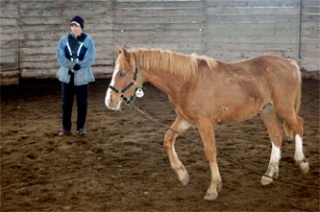ARLINGTON — An experienced Extreme Mustang Makeover competitor, Jamie Thomas of Auburn, demonstrated to a group of horse enthusiasts Saturday just how gentle and trainable wild mustangs can be.
In her “gentling” demonstration, a pretty brown mustang was quickly socialized to be in the same arena with others.
She did her demonstration at Black Raven Stables, north of Arlington, at a Mustang Adoption event presented by the Bureau of Land Management.
“Jamie has competed in several Extreme Mustang Makeover competitions,” said Beth Hill, a member of the Backcountry Horsemen group who volunteered to help at the event.
The BLM is seeking good homes for 18 wild horses, said Rick McComas, Natural Resource Specialist with the Spokane BLM.
“We are trying to show the public that these horses are very trainable,” McComas said.
“In fact, Homeland Security is using them to patrol the borders at Canada and Mexico,” he added.
The mustangs are perfect for the job, he said, because of their gentle manner and soft foot.
Two Homeland Security officials who use trained mustangs in their work were present at the event, which was brought to Arlington through personal connections.
“Tracy asked us to host the event,” said Gretchen Salstrom, an owner of Black Raven Stables.
The available horses were from the scenic Heath Creek/Sheepshead and Alvord-Tule Springs Herd Management Area in southeastern Oregon.
Mustang Makeover is an effort developed by the Mustang Heritage Foundation and the BLM to bring together America’s passion for its iconic mustangs and the challenge of training wild horses in a unique competition, the Extreme Mustang Makeover.
A local man, Kyle Churchill also competed in a Mustang Makeover this spring and is planning to do it again in Texas next year.
A full-time trainer, Churchill said he just recently gave up his day job in metal work, since there is currently enough work in training horses.
“It’s not that hard, really,” Churchill said about training mustangs. “Anyone can do it.”
The BLM is relocating mustangs because it is charged with managing healthy herds on healthy rangelands, as the result of the Wild Free-Roaming Horses and Burros Act of 1971. When wild horse populations become too big for a geographical area, excess animals are offered to the general public for adoption at events like this one in Arlington.
“Some colors of mustangs are always the first to go,” Hill explained. “Today we have mostly the more boring brown colored ones,” she said.
Hill, who lives in Marysville, said she would not be adopting any mustangs.
“I have three critters already trying to eat me out of house and home,” she joked.
The BLM manages 256 million acres in 12 western states as well as 700 million acres of sub-surface mineral estate throughout the nation.
For information about the Wild Horse and Burro Program, the adoption, or applications, please contact the BLM at 866-4MUSTANGS or see the Web site at www.wildhorseandburro.blm.gov.








